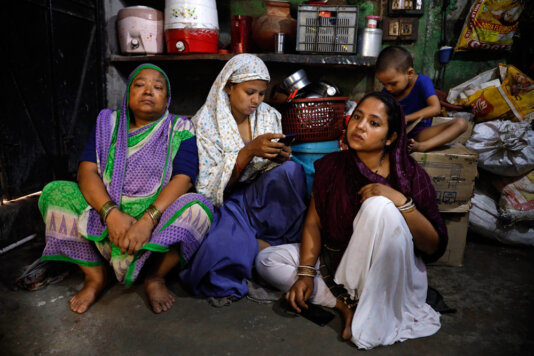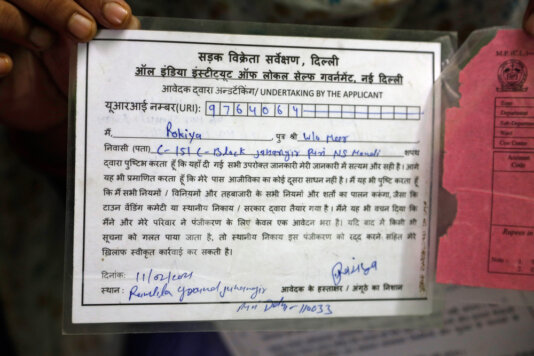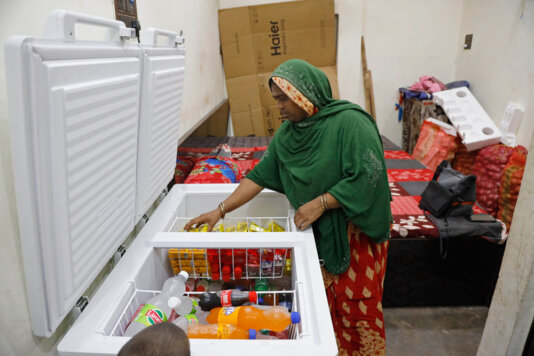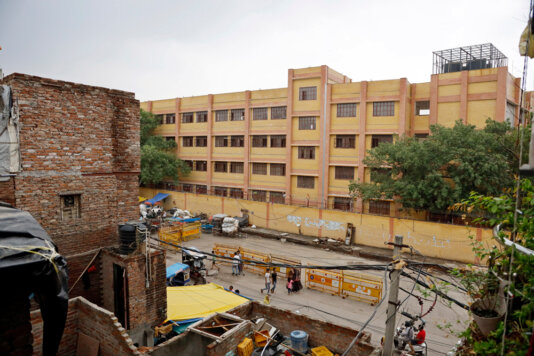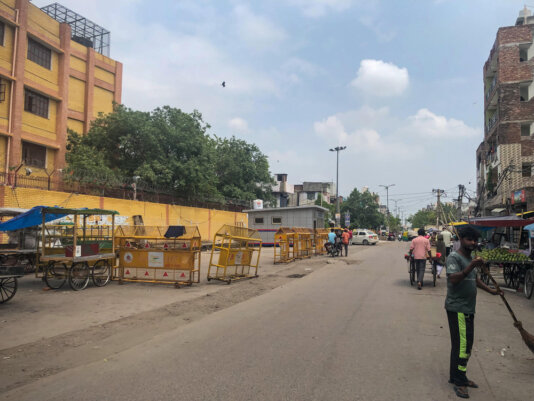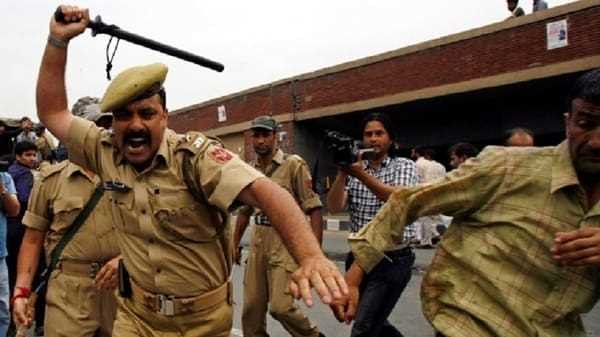- About
- Topics
- Story
- In-Depth
- Picks
- Opinion
- News
- Donate
- Signup for our newsletterOur Editors' Best Picks.Send
Read, Debate: Engage.
| July 28, 2022 | |
|---|---|
| topic: | Islamophobia |
| tags: | #India, #Islamophobia, #women's rights, #BJP, #Hindu nationalism |
| located: | India |
| by: | Kamran Yousuf, Asma Hafiz |
In New Delhi’s Jahangirpuri district, a new police post stands across from a dilapidated cinema hall. The C Block area of Jahangirpuri, once bustling with people buying from small shops and kiosks, now lies abandoned. Numerous barricades set up by the police have replaced these makeshift shops.
Through the small alleyways, Rokiya leads us to a dingy one-room house where a small child lies asleep in the scorching Delhi heat.
"We used to earn a meager 200 to 400 rupees a day. The Indian government has run a bulldozer over our dreams," says Rokiya, owner of one of the demolished carts.
During the holy month of Ramadan, when Muslims observe fast, Jahangirpuri witnessed communal tensions that later escalated to violence between groups of Hindus and Muslims in the area. On 16 April, during a Hanuman Jayanti procession - a Hindu religious festival that celebrates the birth of Hindu God Hanuman - which later led to violence, people waved a saffron flag in front of a mosque.
Subsequently, an "anti-encroachment drive" was conducted by the North Delhi Municipal Corporation (NDMC), during which 20 shops were demolished. Interestingly, even after the Supreme Court ordered a stay, the drive continued for over an hour.
As Delhi reeled under intense heat, bulldozers razed shops, mainly run by Muslims, to the ground and destroyed the entrance to a mosque.
Most of the vending carts demolished by the government were owned by Muslim women who sold snacks, groceries and other goods. the drive had thus deprived them of their livelihood and financial independence.
This year has seen a surge in violence perpetrated by the State on Muslims, and a new term, "Bulldozer Politics", is gaining popularity in the Indian subcontinent. The trail of its origin leads us to Yogi Adityanath, the Chief Minister of Uttar Pradesh, who is hailed as the "Bulldozer Baba."
After successfully demolishing the houses of a minority community in Uttar Pradesh (UP), the bulldozer has become an epitome of upholding "rule of law" in BJP-run states.
While rallying for UP elections, Yogi Adityanath had mentioned the word 'bulldozer'. After his victory, people celebrated by getting tattoos of bulldozers and Yogi Adityanath.
Back in Delhi, rummaging through her belongings in a wooden cupboard, Rokiya takes out her neatly stacked documents. Referring to her certificate of vending (CoV), she says, "I had set up my shop ten years ago. If it were illegal, why did they not demolish it earlier?
"I have all the documents, including the certificate of vending, which proves that I am an authorised vendor. They clearly demolished our shops to punish us for being Muslims."
Jahangirpuri is not an isolated event but another chapter in the rise of anti-muslim hate in India. This year alone communal tensions were witnessed in Khargone, Gujarat and New Delhi. In each case, the violence was followed by demolition of Muslim homes and shops. As per human rights defenders and activists, a worrying pattern is emerging from these demolition drives which are politically motivated.
Shabnum Nafeesa Kalim is a social activist who runs an NGO, Khair Help Foundation. She has been actively involved in providing aid to the victims who lost their livelihood. As the violence escalated in Jahangirpuri, the police stopped residents from moving towards the vending carts and locked them behind metal gates. To gain access in the area a day after, Shabnum removed her headscarf to hide her Muslim identity.
"While the police disallowed the movement of local residents, the media left no stone unturned in feeding upon the misery of victims. The government boasts about empowering Muslim women but when it comes to proving it on ground, they take a backseat. Why are they not questioning Hindu men who were brandishing swords and chanting anti-muslim slogans?"
"They clearly demolished our shops to punish us for being Muslims."
Manwari Bibi, popularly known as Monnu in her locality, wipes dust off of her hands before opening the door to her room. She had just arrived from picking, sorting and selling rags. The room is packed with everyday items and has no ventilation. The low ceiling almost touches her head as she bends to pick up her phone.
Pointing to photographs of her swollen face, she says, "After the breakout of violence, [the police] came to our home at three in the morning and beat us ruthlessly. I was bleeding from my mouth. Nobody from my family was involved in the fight and yet they took away my three brothers in law."
Monnu is a single mother of five children. She left her abusive husband to start a life anew, but little did she know that all her dreams would come crashing down after her kiosk, through which she sold everyday items, was reduced to rubble. According to her, she suffered a loss of 2 lakh rupees (USD $2,500).
Kawalpreet Kaur, an advocate working with the Human Rights Law Network, believes that the demolition that took place in Jahangirpuri was completely illegal since no prior notice was given to the people whose shops were later demolished.
As per judicial interpretation of Article 21 of the Indian constitution and the 2014 Street Vendors (Protection of Livelihood and Regulation of Street Vending) Act, the law guarantees 'protection' and 'regulation' of street vending in urban areas. It grants legal recognition to vendors who cannot be evicted without being surveyed.
"The court must acknowledge the pattern where Muslim residents accused in a communal programme are told that their property is illegal and hence will be demolished," says Kaur. "We saw it in Khargone, Assam, Madhya Pradesh and recently in the case of Aafreen Fatima’s house in Prayagraj.
"The vendors in Jahangirpuri had the Certificates of vending, they had been vending at that site for more than a decade. On what basis did you demolish their shops and homes? Is it because they are muslims?"
People living in Jahangirpuri have been asked to prove their identity as Indian citizens for quite some time. As per several media reports, many politicians and locals label them as "Bangladeshis" and "Rohingyas." However, local residents outrightly reject these accusations. Most of them had migrated from West Bengal in search of better work opportunities and had been living there for 40 years.
A day after the violence, Delhi BJP President, Adesh Gupta, said that the fight was a consequence of the AAP sheltering of Rohingya and Bangladeshi immigrants in the area.
"Bangladeshi? What proof do they have that we are from Bangladesh? Is it because we speak Bengali? Our grandparents migrated to Delhi from West Bengal, which, last I remember, was a part of India," exclaims Rokiya.
Kawalpreet says that an entire narrative is played out in which political parties claim that these people are illegal migrants. A dangerous precedent is thus set, which further marginalises this vulnerable community.
It appearss that the sentiment was manufactured to inspire fear and subsequently punish the Muslim community, whose members were at the receiving end of the violence. Also, most of the people arrested were Muslim, which also raises questions on the fairness and legitimacy of the action taken by the Delhi Police.
Three months have passed since the violence took place in Jahangirpuri. With whatever small help they could get, these women tried to set up their shops again, but the police did not allow them to do so and barricaded the whole area.
When Rokiya tried to confront them, she was taken away to the Police station. A swarm of women reached the station to ensure she was safe. She was released two hours later, however the humiliation had caused her great despair.
"I told them to put me in jail since we didn’t anyway have anything to eat. It would be better if they ran a bulldozer over us and ended our lives. At least, this suffering would come to an end."
Among the 25 people arrested in connection with the violence, 20 were Muslims, and residents accuse the police of carrying a one-sided investigation. NSA (National Security Act) was invoked against five people - all of them belonging to the Muslim community.
"First they destroyed our shops, then they took away our men. They made sure to destroy our lives completely. When we can’t even put food on the table, how are we going to get them out of jail?” cries out Monnu.
As Rihana Bibi opens the lock of her room, we are greeted with a large freezer stationed in one corner and several burlap sacks filled with raw vegetables wasting away. She was the owner of two mobile stalls selling street food and tea. Rihana is the sole breadwinner in her family, as her husband is a diabetes patient. The demolition drive has left her to fend for herself.
"Whatever small amount of money I would make everyday, I would spend it on my family," she says. "I have to buy medicines for my husband. Getting our lives back on track seems like a far-fetched dream."
Images by Asma Hafiz and Kamran Yousuf.
By copying the embed code below, you agree to adhere to our republishing guidelines.
